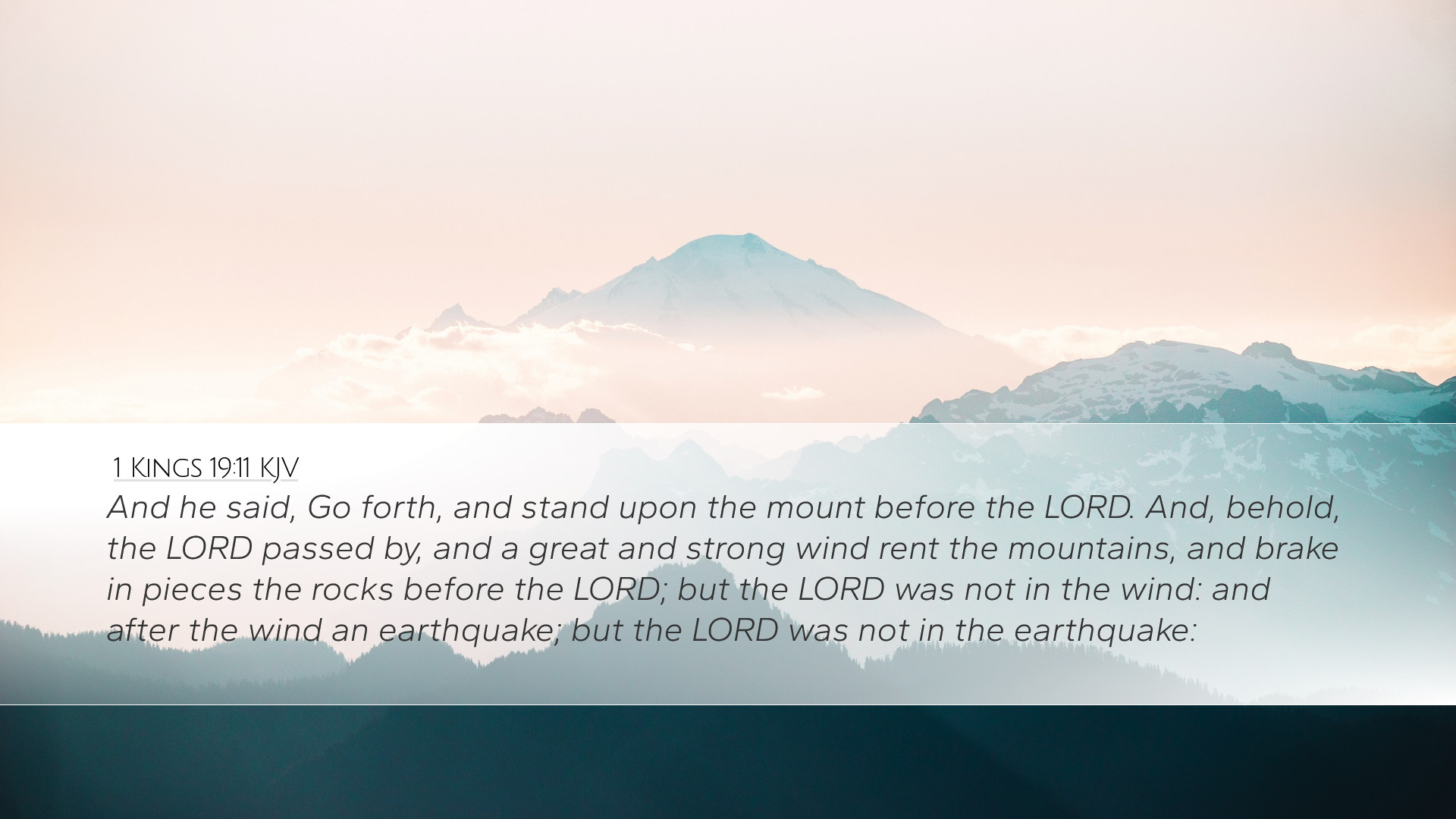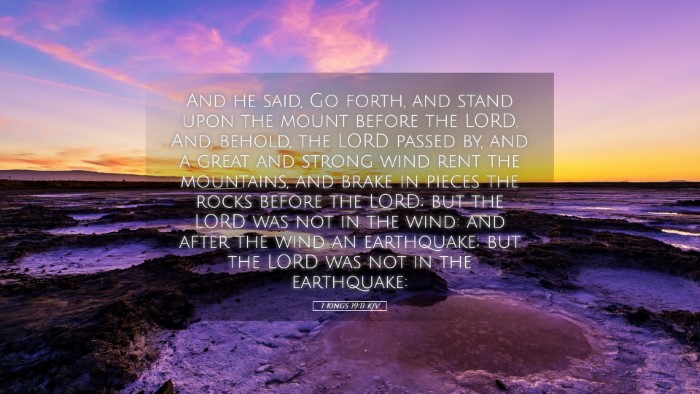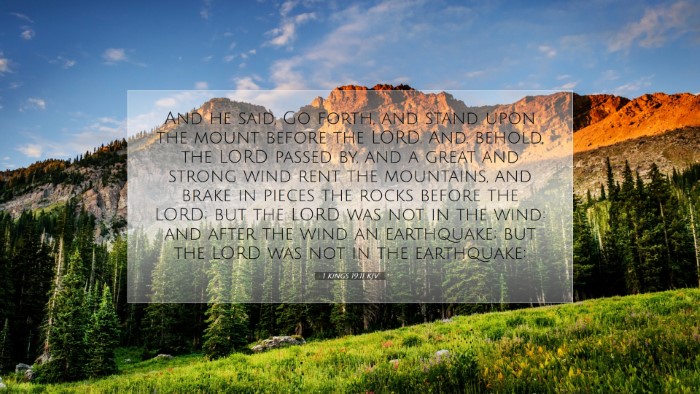Old Testament
Genesis Exodus Leviticus Numbers Deuteronomy Joshua Judges Ruth 1 Samuel 2 Samuel 1 Kings 2 Kings 1 Chronicles 2 Chronicles Ezra Nehemiah Esther Job Psalms Proverbs Ecclesiastes Song of Solomon Isaiah Jeremiah Lamentations Ezekiel Daniel Hosea Joel Amos Obadiah Jonah Micah Nahum Habakkuk Zephaniah Haggai Zechariah Malachi1 Kings 19:11
1 Kings 19:11 KJV
And he said, Go forth, and stand upon the mount before the LORD. And, behold, the LORD passed by, and a great and strong wind rent the mountains, and brake in pieces the rocks before the LORD; but the LORD was not in the wind: and after the wind an earthquake; but the LORD was not in the earthquake:
1 Kings 19:11 Bible Commentary
Commentary on 1 Kings 19:11
Verse Reference: 1 Kings 19:11 - “And he said, Go forth, and stand upon the mount before the Lord. And, behold, the Lord passed by, and a great and strong wind rent the mountains, and brake in pieces the rocks before the Lord; but the Lord was not in the wind: and after the wind an earthquake; but the Lord was not in the earthquake:
Introduction
This passage is set in a significant moment of transition for the prophet Elijah. After the dramatic events on Mount Carmel, where Elijah triumphed over the prophets of Baal, he flees to the wilderness due to the threats from Queen Jezebel. This moment on Mount Horeb (Sinai) marks an encounter with God, revealing profound lessons about divine revelation, the nature of God, and the prophetic ministry.
Contextual Background
Elijah’s flight toward Horeb represents not only a physical journey but also a spiritual retreat. He grapples with feelings of despair and loneliness. God’s command to stand upon the mount indicates a crucial point for Elijah, as he prepares to hear the voice of the Lord. The setting underscores God's continual communication with His prophets, even amidst personal crises.
Analysis of God's Revelation
- The Manifestation of God's Power: Matthew Henry emphasizes that God’s presence is often marked by mighty acts. The strong wind, the earthquake, and the fire are manifestations of His power. However, each time, God is not found in these spectacles.
- God's Presence in the Gentle Whisper: The climactic moment comes as Elijah hears a “still small voice.” Adam Clarke elaborates that God’s true nature surpasses the dramatic displays of power; rather, He often communicates in silence and subtlety. This leads believers to understand that divine encounters aren't always in grand, overt signs.
Theological Implications
This passage profoundly impacts our understanding of God's nature and His ways of communicating with humanity. In a world that often prioritizes the sensational, believers are reminded that God may speak through quietness, urging introspection and receptiveness. Albert Barnes remarks on the need for spiritual attunement to recognize His voice amid life’s tumult.
1. The Contrast of Divine Revelation
The passage sets forth a dichotomy between human expectations of God’s intervention and His actual method. The awe-inspiring phenomena (wind, earthquake) symbolize the thoughts and assumptions people have about divine activity. The subtle voice aligns more closely with the relational aspect of faith, where God seeks connection rather than merely displaying might.
2. The Experience of Isolation
Elijah’s isolation presents a relatable human experience. The commentary illustrates that even the greatest prophets struggle with feelings of helplessness. Matthew Henry notes that in periods of despair, God often draws us closer to Himself to instill hope and purpose.
3. The Call to Action
The directive to stand on the mountain indicates that preparation is vital in hearing God's voice. Adam Clarke asserts that God’s call often requires active participation from believers. This presence requires readiness to respond to divine guidance, emphasizing a dynamic relationship with the Almighty.
Pastoral Applications
- Encouragement for the Weary: Pastors can draw comfort for their congregations from this passage. As many believers face personal challenges, it serves as a reminder that God is close, even when He seems silent.
- Teaching on Divine Communication: It allows for discussions about how God communicates today. The emphasis is on being still and receptive to His guidance rather than seeking only dramatic encounters.
- Preparing for God’s Voice: Encouraging congregations to create space for God through prayer, meditation, and quiet reflection can help them discern His voice in their lives.
Conclusion
1 Kings 19:11 encapsulates a profound truth about the nature of God and the ways He interacts with His creation. The overwhelming events of wind, fire, and earthquake serve as a backdrop to the stillness in which God reveals His presence. This passage invites believers into deeper communion with God, emphasizing the importance of inner stillness and attentiveness to His gentle guidance.
In Summary: The message of 1 Kings 19:11, through the insights of Matthew Henry, Adam Clarke, and Albert Barnes, highlights a transformative understanding of how God speaks to His people in quietness, urging them toward reflection, prayer, and an openness to His subtle yet powerful voice.


